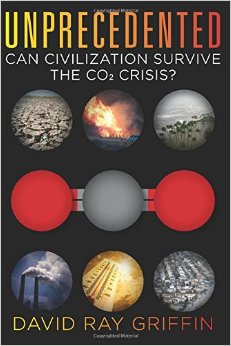 Joel S. Hirschhorn -- World News Trust
Joel S. Hirschhorn -- World News Trust
Feb. 11, 2015
Every so often a nonfiction book comes along that, because of its objective, comprehensive coverage of a hot topic, should be carefully read with a highlighter in hand by everyone.
That new book is "Unprecedented," by David Ray Griffin. Be warned, this book will probably bum you out. It presents the most readable treatment of the global warming and climate change issue that anyone could wish for. It is not an emotional rant, but rather a carefully organized and detailed discussion. Most significantly, with carefully documented sources, it allows a reader to fully appreciate the compelling and overwhelming scientific evidence supporting a negative view of our planet’s and civilization’s future.
Sadly, I suspect that the many climate deniers who most need to read such a book and learn all the facts will probably not do so. However, for the greater number of sensible people who do believe that the planet is, or is likely to be, on a path to unspeakable disaster, this book is a most useful resource to better understand, debate and actively support faster and more effective political action by the United States and other nations.
I was more motivated than most others to read this book because I recently completed a trip into the Antarctic. With my own eyes I saw evidence of what Griffin discusses, including sea-level rise resulting from melting ice and higher ocean temperatures. I find this particular problem perhaps the most compelling of a number of global environmental changes that threatens humanity. Why? Because sea-level rise has been going on for a long time, eating up coastal lands all over the world. But now sea-level rise is accelerating and at such a rapid rate that virtually all major coastal cities are extremely threatened.
Emissions already in the atmosphere spell tragedy for 316 US cities where 3.6 million people live, according to a paper in the Proceedings of the National Academy of Sciences. And without forceful action, things will only get worse.
People may not care much about a few islands disappearing. But untold millions of people will face the need to escape cities worldwide that will not be able to cope with and survive many feet of higher oceans flooding their infrastructure, streets and housing. Where will those millions of people go? How will such deep economic disaster be managed by governments?
What I saw in Antarctica was the melting away of glaciers on mountains. Even more startling was seeing unbelievably large tabular, rectangular icebergs in the ocean near Antarctica, often with dimensions of a mile or more. These are pieces of ice sheets that are increasingly breaking off because of warmer air and water. Third, is the shrinkage of some penguin home sites because of higher temperatures.
Will technology come to the rescue? I am old enough to remember the 1960s when there was a passionate argument that rising population and consequent food shortages spelled global doom. It did not happen. Why? Because various technologies came to the rescue and greatly expanded food production. This and other disaster scenarios that never come to pass foster an attitude of technological optimism. This blocks both political action and public demands for emergency solutions to ecological catastrophe tied to climate change and global warming.
So, will there be a technological solution enacted fast enough to prevent this new nightmare scenario? It is a lot to hope for. It is being called geoengineering. It includes methods to remove carbon dioxide from the atmosphere and to reflect sunlight. Griffin pays just a little attention to geoengineering and not in the final section of the book where it belongs.
A major problem with all those trying to get the public, the media, and the political world to focus on fast actions to sharply cut carbon dioxide emissions now is that they fear attention to geoengineering will make it harder to take rapid actions to replace dirty technologies with green ones. Two new related reports on climate intervention by the U.S. National Academy of Sciences support more geoengineering research. But the head of the research project noted, “We need to do more now to reduce emissions, which is the most-effective, least-risky way to combat climate change.”
The best strategy is to pursue both approaches, emissions reduction and geoengineering, with vigor, but this is not emphasized by Griffin or many others sounding alarms about climate change. With so much at stake, to depend on either approach by itself is foolish. To wait -- until emissions reduction does not greatly cut global disaster threats -- to develop a geoengineering solution is crazy.
Another cautionary note to the many trying to broaden public passion and government action is to stop saying things like what Griffin says at the end of his book: “Given our refusal to cut emissions over the past 30 years, it is already too late to save the kind of world that has been hospitable to human being since the rise of civilization.” Ok, maybe that pessimistic view has some credence. But it also can feed broad public disinterest because it is too late and makes it difficult to take gutsy political action and spend big money on remedies.
As Griffin noted, a 2013 Pew poll found that only 28 percent of Americans believe climate change should be a top priority of federal politicians. What an utterly dismal situation. A more recent 2015 poll found that the segment of the U.S. population having the strongest views for addressing climate change are Hispanics, and, conversely, Republicans have the least concern about it. Unless a large majority of people take responsibility for contributing to planetary suicide the worst scenarios are likely to come true.
I urge everyone who reads this book to get at least three other people to also read it. If pessimism, selfishness and narcissism prevail, concern about future generations will be largely disregarded. Can most people give high priority to the strong possibility that the human race as we know it today does not survive? The subtitle of Griffin’s book is “Can civilization survive the CO2 crisis?” Read the book and you are likely to say No! Then the question is: Are you now motivated to speak up and work to avoid perilous decay and doomsday?
 Joel S. Hirschhorn(Contact Joel S. Hirschhorn through http://articlev.wix.com/statusquobuster.)
Joel S. Hirschhorn(Contact Joel S. Hirschhorn through http://articlev.wix.com/statusquobuster.)






